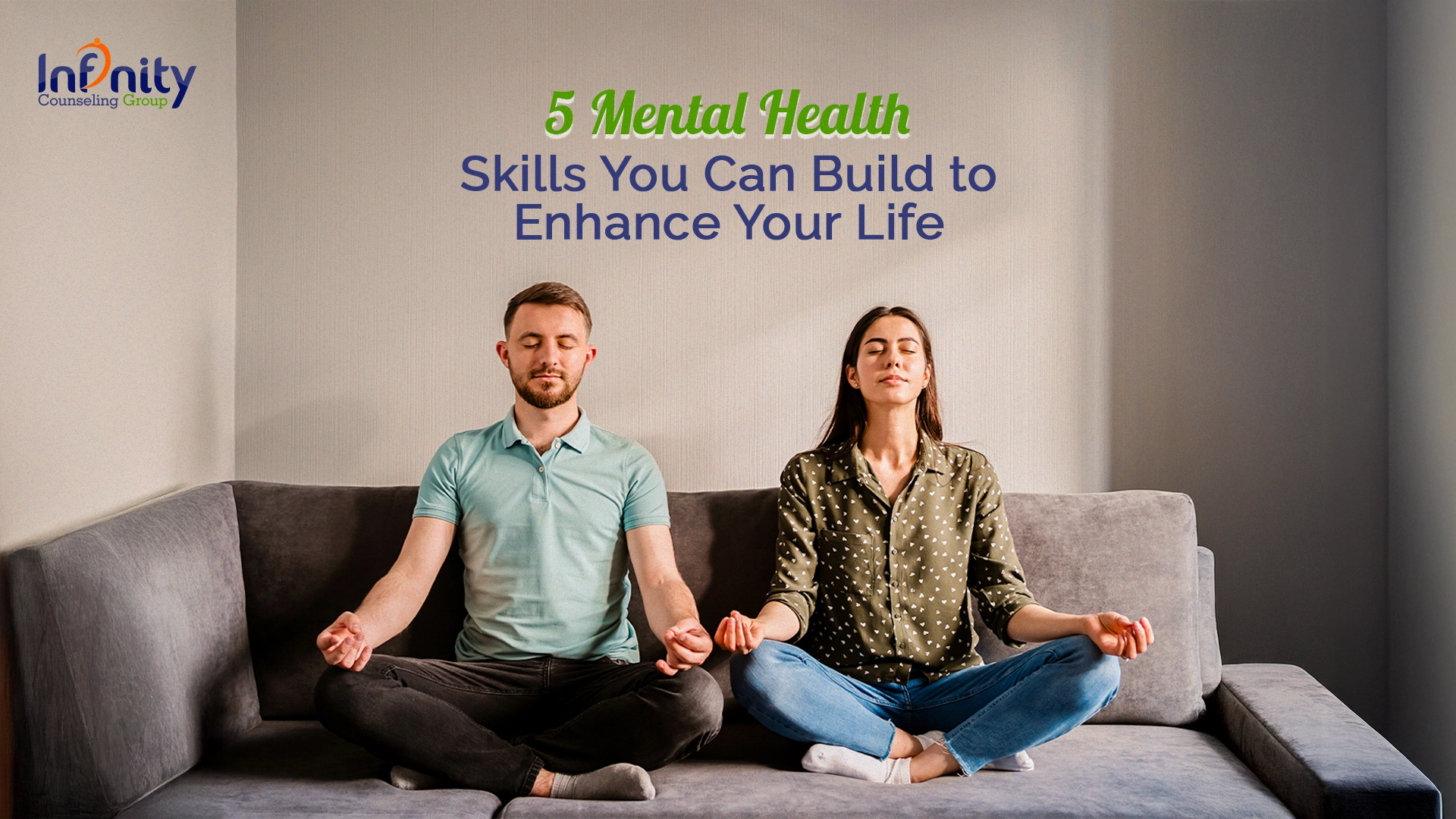
Introduction
When conversations about health come up, physical fitness or diet often get most of the attention. But if you’ve been feeling burnt out, lying awake with racing thoughts, or finding that everyday stress feels heavier than it used to, you know that your mental health matters just as much. The truth is, your mind needs care and strengthening just like your body does. Through mental health skill building, you can learn practical ways to manage stress, calm overwhelming emotions, and find more balance in your daily life.
1. Stress Management: The Foundation of Resilience
Stress is a regular part of life, but when it starts showing up as constant tension in your shoulders, sleepless nights, or a short fuse with loved ones, it can feel overwhelming. You may have already tried quick fixes like deep breathing or taking short breaks, but they don’t stick. That doesn’t mean you’re failing; it just means you might need a different approach.
Building stress management as a mental health skill is about finding what truly works for you. For some, that means simple tools like journaling or learning how to set healthier boundaries at work. For others, it may take exploring what’s really behind the stress with the guidance of a therapist.
Suppose you’ve tried managing stress on your own and still feel weighed down. In that case, professional mental health therapy can help you uncover the deeper patterns fueling your stress and give you practical, personalized tools you can carry into everyday life.
2. Emotional Regulation: Mastering Inner Balance
- Learn to notice and name emotions instead of letting them control you.
- Build healthier responses that reduce conflict and protect your peace.
Everyone feels strong emotions, but when they start to dictate your reactions, snapping at loved ones, shutting down during conflict, or feeling like anxiety never lets go, it can be exhausting. Emotional regulation as a mental health skill gives you practical ways to slow down, understand what’s happening inside, and respond with intention rather than impulse. And if you’ve tried on your own but still feel overwhelmed, working with a professional through mental health therapy can provide step-by-step tools to help you regain balance and confidence in handling life’s challenges.
3. Mindful Communication: Building Stronger Connections
Poor communication is one of the leading causes of conflict in personal and professional relationships. Building mindful communication as part of mental health skill building involves more than just speaking; it’s about listening, understanding, and responding with empathy.
- Active listening: Instead of waiting for your turn to speak, focus on truly hearing what the other person is saying.
- Non-verbal cues: Eye contact, tone, and body language often carry more weight than words.
- Assertiveness vs. aggression: Learn to express your needs clearly without dismissing others.
When you refine your communication skills, you foster deeper trust and reduce unnecessary conflicts. Many people enhance this skill through group workshops or therapy sessions offered by mental health services that emphasize interpersonal effectiveness.
4. Cognitive Flexibility: Adapting to Change
Life rarely goes according to plan. Cognitive flexibility is the mental ability to adapt when things shift unexpectedly. Without it, people often feel stuck, anxious, or overwhelmed by change.
- Challenge rigid thinking: Ask yourself, “What’s another way to view this situation?”
- Problem-solving mindset: Instead of focusing on obstacles, identify actionable steps forward.
- Curiosity over fear: Treat change as an opportunity to grow rather than a threat.
This skill is especially valuable in today’s fast-paced world, where uncertainty is the norm. Mental health therapy often integrates cognitive restructuring exercises, which train the brain to reframe challenges and improve adaptability.
5. Self-Compassion: Reducing Inner Criticism
One of the most overlooked mental health skills is self-compassion. Many people are their harshest critics, replaying mistakes and fueling guilt. Self-compassion helps you extend kindness to yourself, especially when you fall short.
- Talk to yourself as you would to a friend: Replace self-criticism with encouragement.
- Acknowledge humanity: Everyone makes mistakes; what matters is learning and moving forward.
- Practice daily affirmations: Simple reminders like “I am enough” help rewire negative thought patterns.
Studies consistently show that self-compassion lowers anxiety and improves overall life satisfaction. For those struggling with negative self-talk, engaging in structured mental health services can provide guided exercises and accountability.
Why Mental Health Skill Building Matters
Unlike quick self-help hacks, these five skills, stress management, emotional regulation, mindful communication, cognitive flexibility, and self-compassion, are long-term investments. By practising them consistently, you strengthen your psychological resilience and improve your ability to handle life’s challenges.
Engaging in professional mental health services or mental health therapy is not a sign of weakness but a proactive step toward building these skills more effectively. Just as you’d see a trainer to optimise your physical fitness, a therapist can guide your mental skill-building with tools tailored to your needs.
Conclusion
If you’re ready to prioritize your well-being, start small. Choose one skill from this list and commit to practising it daily for a week. Over time, the benefits compound, creating lasting improvements in your life.
At Infinity Counselling, we believe in holistic care, supporting not just your physical health but your emotional and mental wellness too. Whether you’re managing daily stress or seeking guidance through mental health therapy, taking that first step matters most.
Ready to invest in your well-being? Visit Infinity Solutions today and explore how our team can support your journey.
FAQ: Mental Health Skill Building for Adults
It’s a set of structured activities and habits—such as journaling, reframing, and goal setting—that improve emotional control and resilience.
Yes. These activities are often used in therapy to support adults with mood disorders, trauma, or ongoing stress.
Daily practice is ideal, but even 3–4 times per week can create noticeable progress.
Many activities can be done independently. However, a therapist can offer deeper personalization, especially for trauma or clinical depression.
